There’s more to politics than what you “run on”
Voters rightly consider everything you and your party say and do.

Even if you reject all of the positive and normative arguments in Welcome PAC’s Deciding to Win document, I think that anyone who is at all interested in American politics would benefit from studying their dual charts of popular and unpopular progressive policies.
I think the debate around issue polling often gets turned around. As I’ve said before, I think the best politicians practice a much more from-the-gut, intuition-based politics that genuinely aims to establish a reputation as a pragmatic, independent thinker who is moderate and gets things done.
But because Democrats have come to rely so heavily on issue polling, anyone working on an issue has an incentive to publish polling that’s misleading. Now, the information landscape about public opinion has been muddied by the fact that advocacy groups have spent the past 10 years commissioning polls designed to make all their ideas seem popular.
The point of these Deciding to Win polls is that, by adopting explicit partisan framing and an “argument versus counterargument” format, they mechanically make every single idea (including conservative ideas) look less popular than an advocacy-style poll would. This, I think, appropriately captures the intuition that voters who self-identify as moderate are decisive, and governors like Andy Beshear and Phil Scott who face opposition-dominated legislatures and therefore don’t actually accomplish very much are extremely popular.
That being said, I would not make a huge deal out of the specific point estimates. What’s useful here is to get a broad sense of which kinds of progressive change people are open to and which they comprehensively reject.
Mostly, people want the government to give more benefits to the elderly, veterans, and maybe kids, and they want rich people to pay for this. But voters are generally extremely hostile to the notion of being softer on crime, to race-based fiddling with the school system, to personally paying more in taxes or for energy, and to being nicer to immigrants. You can also do the reverse exercise for Republicans where you find that the welfare state rollback is unpopular but people have various conservative cultural views and would like to pay less in taxes personally.
When I’ve challenged people to spend some time staring at the unpopular ideas list, one common rebuttal I get is, “Well it’s not like Democrats are running on this stuff.”
But so what? Donald Trump didn’t “run on” slashing programs for the poor in 2024, but I had an evidence-based belief that if he won the election he would do that and I held it against him. Democrats don’t need to “run on” prioritizing climate over material prosperity or equity over merit for voters to develop the belief that they do those things and hold it against them.
The limited power of the campaign
A common retort to the whole project of moderation is, essentially, that Kamala Harris already ran a moderate campaign and lost … and even moderates like me praised her at the time!
I think this raises the question of what, conceptually, it means to “run on” something and, more broadly, what exactly the role of the campaign is in politics.
Keep reading with a 7-day free trial
Subscribe to Slow Boring to keep reading this post and get 7 days of free access to the full post archives.


